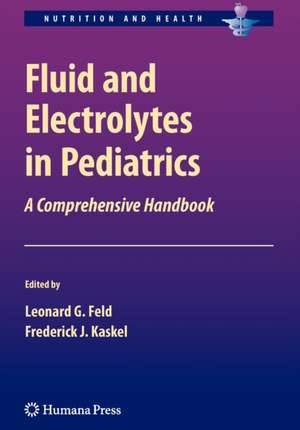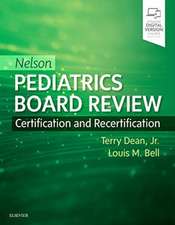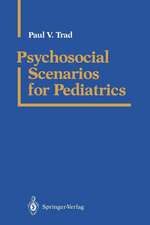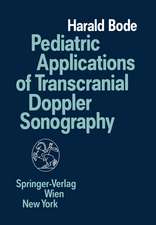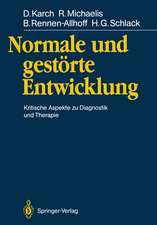Fluid and Electrolytes in Pediatrics: A Comprehensive Handbook: Nutrition and Health
Editat de Leonard G. Feld, Frederick J. Kaskelen Limba Engleză Paperback – 25 oct 2011
| Toate formatele și edițiile | Preț | Express |
|---|---|---|
| Paperback (1) | 728.89 lei 6-8 săpt. | |
| Humana Press Inc. – 25 oct 2011 | 728.89 lei 6-8 săpt. | |
| Hardback (1) | 1305.48 lei 6-8 săpt. | |
| Humana Press Inc. – 24 dec 2009 | 1305.48 lei 6-8 săpt. |
Din seria Nutrition and Health
- 5%
 Preț: 1130.43 lei
Preț: 1130.43 lei - 5%
 Preț: 1006.13 lei
Preț: 1006.13 lei - 5%
 Preț: 1436.77 lei
Preț: 1436.77 lei - 5%
 Preț: 1134.09 lei
Preț: 1134.09 lei -
 Preț: 494.66 lei
Preț: 494.66 lei - 5%
 Preț: 932.05 lei
Preț: 932.05 lei - 5%
 Preț: 2153.61 lei
Preț: 2153.61 lei - 5%
 Preț: 1424.89 lei
Preț: 1424.89 lei - 5%
 Preț: 1615.25 lei
Preț: 1615.25 lei - 5%
 Preț: 1430.35 lei
Preț: 1430.35 lei - 5%
 Preț: 1118.73 lei
Preț: 1118.73 lei - 5%
 Preț: 1110.32 lei
Preț: 1110.32 lei - 5%
 Preț: 1434.18 lei
Preț: 1434.18 lei - 5%
 Preț: 1119.47 lei
Preț: 1119.47 lei - 5%
 Preț: 1552.10 lei
Preț: 1552.10 lei - 5%
 Preț: 1343.45 lei
Preț: 1343.45 lei - 5%
 Preț: 1123.13 lei
Preț: 1123.13 lei - 5%
 Preț: 803.75 lei
Preț: 803.75 lei - 5%
 Preț: 1108.72 lei
Preț: 1108.72 lei - 5%
 Preț: 1110.32 lei
Preț: 1110.32 lei - 5%
 Preț: 990.58 lei
Preț: 990.58 lei - 5%
 Preț: 1309.67 lei
Preț: 1309.67 lei - 5%
 Preț: 1425.61 lei
Preț: 1425.61 lei - 5%
 Preț: 1731.50 lei
Preț: 1731.50 lei - 5%
 Preț: 1056.95 lei
Preț: 1056.95 lei - 5%
 Preț: 1963.41 lei
Preț: 1963.41 lei - 5%
 Preț: 378.24 lei
Preț: 378.24 lei - 5%
 Preț: 1110.72 lei
Preț: 1110.72 lei - 5%
 Preț: 1426.71 lei
Preț: 1426.71 lei - 5%
 Preț: 1910.00 lei
Preț: 1910.00 lei - 5%
 Preț: 1110.32 lei
Preț: 1110.32 lei - 5%
 Preț: 1103.58 lei
Preț: 1103.58 lei - 5%
 Preț: 1439.50 lei
Preț: 1439.50 lei - 5%
 Preț: 1607.01 lei
Preț: 1607.01 lei - 5%
 Preț: 1321.41 lei
Preț: 1321.41 lei - 5%
 Preț: 1956.63 lei
Preț: 1956.63 lei - 5%
 Preț: 1618.70 lei
Preț: 1618.70 lei - 5%
 Preț: 1441.52 lei
Preț: 1441.52 lei - 5%
 Preț: 1123.13 lei
Preț: 1123.13 lei - 5%
 Preț: 720.84 lei
Preț: 720.84 lei
Preț: 728.89 lei
Preț vechi: 767.26 lei
-5% Nou
139.48€ • 144.11$ • 116.03£
Carte tipărită la comandă
Livrare economică 19 martie-02 aprilie
Specificații
ISBN-10: 1617794104
Pagini: 432
Ilustrații: XVIII, 412 p.
Greutate: 0.74 kg
Ediția:2010
Editura: Humana Press Inc.
Colecția Humana
Seria Nutrition and Health
Locul publicării:Totowa, NJ, United States
Public țintă
Professional/practitionerCuprins
Fluid and Electrolyte Disorders in Pediatrics(Potential authors in Bold)TABLE OF CONTENTSIntroduction:A discussion on developmental and clinical measurements of renal functionSection I: Disorders of Sodium Homeostasis Kaskel / Del Rio Woroniecki 1. General Overview of Sodium Balance and Renal Regulation Neonatal Sodium RegulationChanges as a function of age2. Clinical Assessment of Renal Sodium Excretion 3. Isovolemic Disorders Definition and Pathophysiology SymptomsDiagnosis and CausesTreatmentScenarios4. Hypovolemic Disorders Definition and Pathophysiology SymptomsDiagnosis and CausesTreatmentScenarios5. Hypervolemic Disorders Definition and PathophysiologySymptomsDiagnosis and CausesTreatmentScenariosSection II: Disorders of Water Homeostasis Feld / Massengil Friedman 6. General Overview of Water Balance and Renal Regulation Neonatal Water RegulationChanges as a function of age7. Clinical Assessment of Renal Water Excretion 8. Hyponatremic Disorders Definition and PathophysiologySymptomsDiagnosis and CausesTreatmentScenarios9. Hypernatremic Disorders Definition and PathophysiologySymptomsDiagnosis and CausesTreatmentScenariosSection III: Disorders of Potassium Homeostasis Linshaw 10. General Overview of Potassium Balance and Renal Regulation Neonatal Potassium RegulationChanges as a function of age11. Clinical Assessment of Renal Potassium Excretion12. Hypokalemic Disorders Definition and PathophysiologySymptomsDiagnosis and CausesTreatmentScenarios13. Hyperkalemic Disorders Definition and PathophysiologySymptomsDiagnosis and CausesTreatmentScenariosSection IV: Disorders of Calcium Homeostasis McKay 14. General Overview of Calcium Balance and Renal Regulation Neonatal Calcium RegulationChanges as a function of age15. Clinical Assessment of Renal Calcium Excretion16. Hypocalcemic Disorders Definition and PathophysiologySymptomsDiagnosis and CausesTreatment Scenarios17. Hypercalcemic Disorders Definition and PathophysiologySymptomsDiagnosis and CausesTreatmentScenariosSection V: Disorders of Magnesium Homeostasis McKay 18. General Overview of Magnesium Balance and Renal Regulation Neonatal Magnesium RegulationChanges as a function of age19. Clinical Assessment of Renal Magnesium Excretion20. Hypomagnesemic Disorders Definition and PathophysiologySymptomsDiagnosis and CausesTreatmentScenarios21. Hypermagnesemic Disorders Definition and PathophysiologySymptomsDiagnosis and CausesTreatmentScenariosSection VI: Disorders of Phosphorus Homeostasis Johnson 22. General Overview of Phosphorus Balance and Renal Regulation Neonatal Phosphorus RegulationChanges as a function of age23. Clinical Assessment of Renal Phosphorus Excretion24. Hypophosphatemic Disorders Definition and PathophysiologySymptomsDiagnosis and CausesTreatmentScenarios25. Hyperphosphatemic Disorders Definition and PathophysiologySymptomsDiagnosis and CausesTreatmentScenariosSection VII: Disorders of Acid-Base Homeostasis: Schwartz 26. Normal Acid-Base Homeostasis Key Aspects for Understanding Buffering, Respiratory Compensation and Renal Acidification27. Diagnosis and Treatment of Metabolic Acidosis Corey 2
Recenzii
“This book follows suit, with generous and extensive tables, figures and appendices and a useful index. … targeted at a gap in the existing literature and fill it with a comprehensive up to date primer on the management of fluid and electrolyte disorders in infants and children. Within this handbook is found essential practice guidance aimed at improving the medical nutritional care of this age group and will be an invaluable resource for any health care professional tasked with providing such care … .” (Michael J. Glade, Nutrition, Vol. 26, 2010)
Notă biografică
Leonard G. Feld, MD, PhD, MMM, FAAP, is the Sara H. Bissell & Howard C. Bissell Endowed Chair in Pediatrics and Chief Medical Officer at the Levine Children’s Hospital at Carolinas Medical Center, and Clinical Professor of Pediatrics at UNC School of Medicine The Levine Children’s Hospital is the largest children’s hospital between Washington DC and Atlanta with 12 floors and 234 beds. Prior to joining the Carolinas Healthcare System, Dr. Feld was chairman of pediatrics for the Atlantic Health System and physician-in-chief of the Goryeb Children’s Hospital in New Jersey from 1997 to 2006. He was also Professor of Pediatrics at UMDNJ-New Jersey Medical School. Prior to 1997, he served as Chief of Pediatric Nephrology in the Department of Pediatrics at Children’s Hospital in Buffalo, vice chairman of pediatrics and professor of pediatrics at the State University of New York at the Buffalo School of Medicine. Dr. Feld received his medical degree and Ph.D. from the State University of New York at Buffalo, School of Medicine. He continued his post-graduate training in pediatrics and pediatric nephrology at the Albert Einstein College of Medicine in New York. Dr. Feld also has a Masters in Medical Management from Carnegie Mellon University. Dr. Feld has published 120 articles, 45 monographs/chapters, an editor or contributing editor to 9 books, and 103 abstracts. He is co-editor of the textbook – Fast Facts in Pediatrics and is co-editor-in-chief of Consensus in Pediatrics. He is also co-editor for an issue of Pediatric Clinics of North American on Pediatric Quality to be published in August 2009. His new textbook – Handbook of Fluid and Electrolytes in Pediatrics is to be published by Humana Press (Springer). He also serves on the editorial board of Pediatrics in Review (American Academy of Pediatrics) and is a member of the Board of Directors of Horizon Blue Cross/ Blue Shield of New Jersey. Dr. Feld is listed in the Best Doctors in America, How to Find the Best Doctors and A Guide to America’s Top Pediatricians. His areas of clinical interest include diabetic nephropathy, hypertension and fluid/electrolyte management in pediatrics. Dr. Frederick J. Kaskel is a renowned national and international physician-investigator in the field of Nephrology. He is a Pediatric Nephrologist and a past President of the American Society of Pediatric Nephrology, a Professor of Pediatrics at the Albert Einstein College of Medicine, a Vice Chairman of Pediatrics and Director of the Division of Pediatric Nephrology at the Children’s Hospital at Montefiore, and Director of the National Institutes of Health supported Training Program in Pediatric Nephrology at the Albert Einstein College of Medicine, Bronx, NY, where he received his Residency training in pediatrics and nephrology. Dr. Kaskel was a co-chairman of the important FSGS in Children Task Force created by the National Institutes of Health in 2000 to discuss plans for the current FSGS clinical trials funded by the National Institute of Health. He is the Chairman of the Council of Pediatric Nephrology and Urology of the Kidney and Urology Foundation of America, a former Chairman of the Enuresis Committee of the National Kidney Foundation, and the Congress President for the 15th Congress of the International Pediatric Nephrology Association to be held in New York City in August, 2010. He is also the Medical Director of the Ruth Gottscho Children’s Kidney Program at Frost Valley YMCA, which allows children on dialysis, in CKD or who have received a kidney transplant to mainstream at summer camp. He is listed in the Best Doctors in New York and America, and has received numerous recognitions included Distinguished Alumni of Monmouth College (Illinois) and the University of Cincinnati College of Medicine. He is the Principal Investigator on the National Institutes of Health (NIH) multi-center clinical study of focal segmental glomerulosclerosis (FSGS) in children and co-PI on the Chronic Kidney Disease in Children Study (NIH). Dr. Kaskel lives in Mamaroneck New York with his wife Phyllis and they have 4 daughters and one granddaughter. In his free time, Dr. Kaskel likes to relax by reading, sailing and hiking.
Textul de pe ultima copertă
One of the time-honored foundations of the practice of pediatric medicine is the understanding and application of the principles of fluid, electrolyte and acid-base disorders. Presented in a new softcover format, Fluid and Electrolytes in Pediatrics: A Comprehensive Handbook brings together a select group of authors who share a passion and an appreciation of the contributions of pioneers in pediatric medicine and an expertise for their respective areas in a new softcover edition. The volume provides in-depth discussions of the basic functioning of the kidneys, skin and the lungs. Each chapter describes the etiology and demographics, biological mechanisms, patient presentation characteristics, therapy options and consequences of optimal treatment as well as delayed treatment. Fluid and Electrolytes in Pediatrics: A Comprehensive Handbook provides health professionals in many areas of research and practice with the most up-to-date, accessible, and well referenced volume on the importance of the maintenance of fluid and electrolyte concentrations in the pediatric population, especially under acute care.
Caracteristici
The "go to" source for pediatricians, residents, students and allied health professionals
Presents unique information with extensive tables, lists, and algorithms
Descriere
For more than a decade, there has been no resource to guide the practitioner, trainee or allied health professional in this important field of pediatrics. These disorders are addressed every day with children admitted to the neonatal intensive care unit, pediatric intensive care unit, inpatient units, day hospitals, surgical units (inpatient and ambulatory), emergency rooms or in the outpatient setting.
Fluid and Electrolytes in Pediatrics: A Comprehensive Handbook is a complete compendium of ready access information for pediatricians, family practitioners, residents, students and allied health professionals. The manual will be a "go to" source for tables or information on any aspect of fluid, electrolyte and acid-base metabolism for general pediatrics/ family practitioners/residents/medical students/nurses or the medical or surgical specialties.
In order to achieve the goal as the "THE" textbook in this discipline, each chapter of the book will be divided into the following areas: Definition and Pathophysiology, Symptoms, Diagnosis and Causes, Treatment and Representative Scenarios. Case presentations/problems (6-10) to illustrate the key points within the chapter. The scenarios will attempt to cover the most common problems that present in pediatrics.
This book will have unique information with extensive tables, lists, and algorithms that detail clinical features of the entire spectrum of water metabolism, disorders of electrolytes, and disturbances in acid-base homeostasis by age (infants/newborns, children and adolescents) that is not available in any other textbook.
